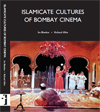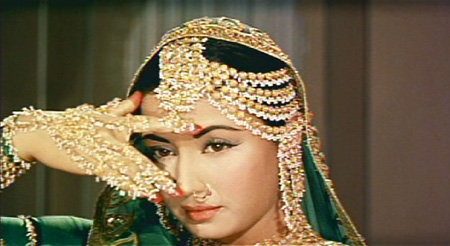
| Invitation |
| Screening Schedule |
| Abu dhabi Festival |
| Reviews |
| Book Sale & Signing |
 |
| www.wnyc.org Muslims on the Big Screen: Emperors and Extremists May 24, 2010 by Arun Venugopal |
 Pakeezah |
It’s not easy being a moviegoer these days. Having emerged from my post-Oscar coma a few weeks ago, I’ve been struggling to stay on top of the city’s cinematic bounty, whether it’s the longer, uncut “Metropolis” (Film Forum), the “Cremaster” series (IFC Center) or “Iron Man 2″ (everywhere). None of these need help luring audiences. But if there’s one series that should be getting a lot more attention (and crowds) than it is, it would be “Social Dramas and Shimmering Spectacles: Muslim Cultures of Bombay Cinema,” playing at the Walter Reade Theater through the May 27. Bollywood has failed to cross over in this country, and that owes a lot to its reputation for frothy, ridiculous spectacles. What most people don’t realize is that periodically, Indian cinema isn’t just entertaining, but relevant as well, particularly at this point in time, when issues like Islamic radicalization and cartoon images of the Prophet Muhammad dominate the news. If you’ve overdosed on the standard talking points — the Us vs. Them geopolitics of Islam hashed out on cable news, ad nauseam — consider this series a tonic of sorts. Its 13 films range from historical blockbusters like “Mughal-e-Azam” (set during the extravagant, 16th century reign of Mughal Emperor Akbar) to modern critiques of India’s Partition and the place of Muslims in society (”Garm Hawa“), to recent movies about radicalization, like “Fiza,” starring heartthrob Hrithik Roshan as the Muslim turned terrorist. I’ve actually seen “Fiza,” earlier, and thought it got pretty ridiculous by the end. But what it does accomplish — which rarely if ever happens in Hollywood movies — is provide a window into the mind of someone who decides to become an extremist. The film festival was organized by Richard Allen, an NYU film studies professor, along with Ira Bhaskar, who teaches at Jawaharlal Nehru University, in New Delhi. Their recent book, “Islamicate Cultures of Bombay Cinema,” looks at the full history of Muslim historical films, the genre known as the Muslim Social, as well as movies about courtesans, like the hugely popular Pakeezah. I met up with Allen at a recent party launching the film series. It was a fairly lavish affair, organized by the Indo-American Arts Council. Guests were required to come dressed in Mughal attire, and of course I obliged, if primarily out of fear. More than mere spectacles, Allen thinks some of these films were instructive as well regarding basic issues like gender divisions. “These were films that once addressed to the Muslim community, ‘How are we to deal with the pressures of social change on traditional social life. How are we to deal with education?’” And in the absence of any meaningful artistic examination of issues related to Islam emerging from Western popular culture, he thinks India — namely Indian culture — has something to say to the rest of the world. “It’s a history that involves a partition and a history that involves communalism,” he said. “But it’s a history that more than any other country one can think, in this contemporary period, lived through and lived with how to negotiate conflict and how to resolve conflict. So there’s tremendous opportunities for India in this regard.” The film festival runs through May 27. |
| Source: http://blogs.wnyc.org/micropolis/2010/05/24/muslims-on-the-big-screen-emperors-and-extremists/ |